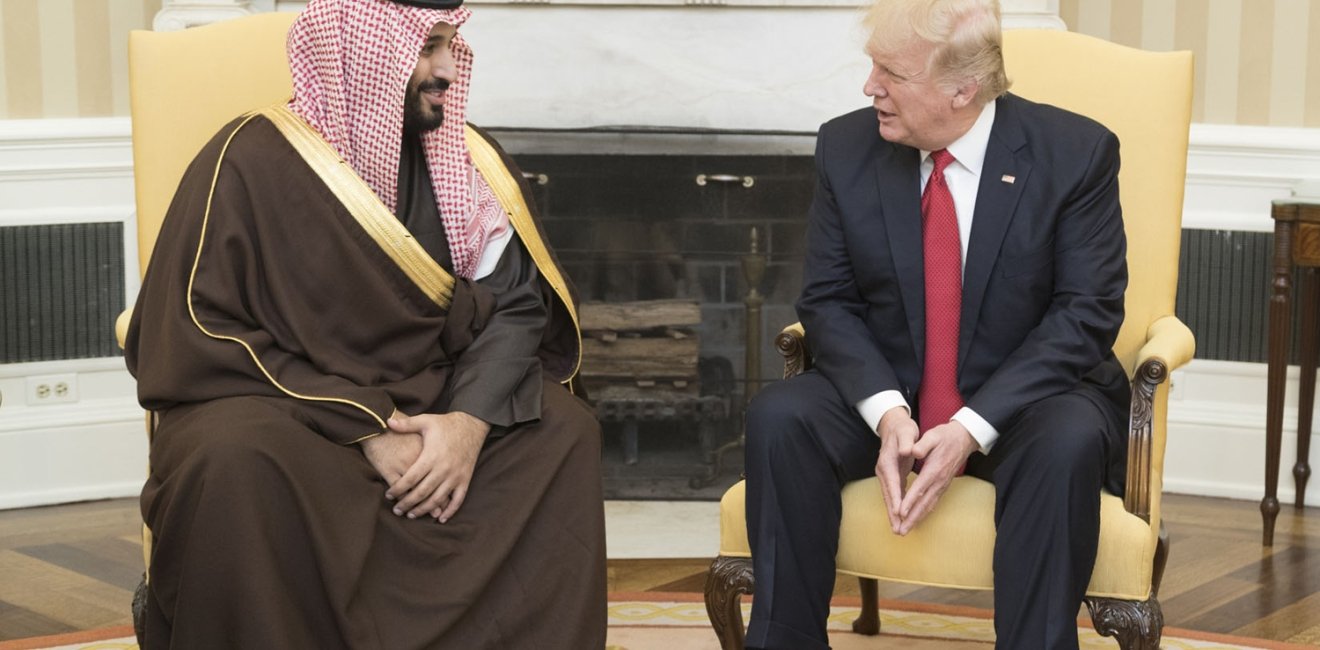President Trump still has at least one Arab friend determined to stick with him despite the latest proof of his unpredictability in abandoning pro-American Kurds to a Turkish onslaught in northern Syria: Crown Prince Mohammed bin Salman of Saudi Arabia.
Russian President Vladimir Putin visited Riyadh Monday having offered to provide the Saudi kingdom with an alternative missile defense system to the American one that so spectacularly failed to detect or intercept a swarm of Iranian drones and missiles that hit Saudi oil facilities on Sept. 14. The Iranian stealth attack cut Saudi production for two weeks by more than half, five percent of all current world production.
Putin’s visit had already been announced in June. However, in the wake of Trump’s abandonment of America’s main ally in Syria, it had raised speculation whether Saudi Arabia would be so worried it will be next that it would turn to Russia for protection. This is what the Syrian Kurds are now doing. The signal would have been the announcement of a Saudi-Russian arms deal, a decision apparently too risky at a time of considerable turbulence already in the U.S.-Saudi relationship for even the risk-prone crown prince to take.
The two sides signed twenty agreements but not one of them mentioned Saudi purchase of the much-vaunted Russian S-400 missile defense system they have been discussing for over a year. In fact, they did not even mention the possible Saudi purchase of other Russian arms, also under Saudi consideration for over a year.
Nor was a word said about the Russian offer to build the kingdom’s first two nuclear energy plants which U.S. companies find themselves at a disadvantage to bid on. This is because of the Atomic Energy Act of 1954 that forbids them from providing to other countries American technology to enrich uranium. The Saudis, citing Iran’s ability already to do this, are insisting upon that option.
But it seems Crown Prince Mohammed, the kingdom’s de facto ruler under his aging father King Salman, has decided to stick with Trump, once his idol, despite the risk of U.S. abandonment in a future crisis with Iran.
Instead, the Saudi and Russian sovereign wealth funds pledged various joint investments in the Russian economy and continuing cooperation in setting their respective levels of oil production to keep world prices from tanking. Both are now deliberately holding down output to cope with the United States, enjoying a record production of over 12 million barrels a day thanks to the shale oil revolution.
It is always possible Russia and Saudi Arabia have signed secret arms and nuclear agreements that will only be revealed later. But it seems Crown Prince Mohammed, the kingdom’s de facto ruler under his aging father King Salman, has decided to stick with Trump, once his idol, despite the risk of U.S. abandonment in a future crisis with Iran.
The prince has been counting on the American president to protect the kingdom from the increasingly bold drone and missile attacks of Iran and its proxies in Yemen and Iraq. Starting in July, the United States started sending hundreds of troops, anti-missile batteries and aircraft to Saudi Arabia in response to Iranian-sponsored attacks on Saudi and other oil tankers and then in June the shooting down of a U.S. drone.
In the wake of the latest and most devastating one, Trump has approved Pentagon plans to bolster further Saudi defenses by sending three additional anti-missile batteries, two squadrons of fighter jets and 1,800 soldiers. After sixteen years of no American troops on Saudi soil, there are now around 3,000. The buildup will help offset the firepower now provided by the USS Abraham Lincoln aircraft carrier group scheduled to leave the Persian Gulf region shortly, with no announced plans to replace it.
But the real question facing the Saudis is whether Trump, who failed to respond militarily after the Iranian attack on the crown jewel of their oil industry, will ever authorize any retaliation if only Saudi targets are hit. Trump has made crystal clear he has no intention of embroiling himself in another “ridiculous unending war” as he calls American military involvement in Afghanistan, Iraq and Syria. This seems ever less likely given the challenges facing him at home: impeachment and next year’s presidential election.
The Saudis, too, are changing their tune, becoming less bellicose toward Iran as Trump backs away from military confrontation. So, too, have Saudi Arabia’s neighboring Arab monarchies. Their closest military ally, the United Arab Emirates, has pulled its troops out of the Saudi-led coalition fighting Iranian-backed Houthi rebels in Yemen and carefully avoided blaming Iran for attacks on its oil tankers. It has even sent a delegation to Tehran to talk about maritime cooperation. The Saudis have also now accepted mediation by Pakistan and Iraq to open a dialogue with Tehran.
Trump hasn’t used the same language yet as his nemesis, former President Barak Obama, but he may have reached the same conclusion, namely it is time for Iran and Saudi Arabia to learn how “to share the neighborhood” rather them either of them dragging the United States into another Middle East war.






